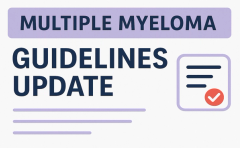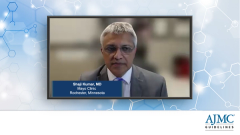
Reshaping Myeloma Treatment: The Promise of Early Immunotherapy With Linvoseltamab
Shaji Kumar, MD, Mayo Clinic, explores the potential for earlier intervention and curative approaches in multiple myeloma, and explains how harnessing a patient's immune system through therapies like T-cell redirection could lead to better disease control, significantly extending progression-free survival and ultimately improving patient outcomes.
Episodes in this series

Although multiple myeloma is often considered incurable, the development of highly effective new therapies is creating a real possibility of a cure for some patients. Current 4-drug upfront regimens, when combined with a transplant, have already pushed the estimated progression-free survival (PFS) to over 10 years—an outcome that was unimaginable just a decade ago. The next step in advancing care involves integrating powerful immunotherapies into these treatment plans.
This has led to studies of drugs like linvoseltamab in earlier stages of multiple myeloma and even in precursor conditions like smoldering myeloma, with the rationale being that early interception is compelling, as myeloma is preceded by these precursor phases. For instance, nearly half of patients diagnosed with smoldering myeloma will progress to active disease within about 5 years. By intervening early with effective therapies, researchers hope to delay the onset of active myeloma or potentially cure the condition before it fully develops.
The mechanism of immunotherapies is central to this new strategy. Linvoseltamab works by capitalizing on the patient's own immune system. It targets BCMA on multiple myeloma cells and CD3 on T cells, activating the T cells to fight the cancer. The hope is that by harnessing the body's immunity, treatments can achieve excellent disease control while avoiding the long-term adverse effects associated with some current medications. This approach may also normalize the immune system, which could decrease the risk of relapse and potentially revert the patient to an earlier stage of the disease.
Ongoing trials are now assessing bispecific antibodies as part of initial therapy. If these trials prove successful, they could extend first-line PFS to 15 years or more, fundamentally reshaping treatment strategies. This focus on earlier intervention and leveraging the patient's own immune system offers a promising path toward not just long-term disease control, but a potential cure.
Newsletter
Stay ahead of policy, cost, and value—subscribe to AJMC for expert insights at the intersection of clinical care and health economics.










